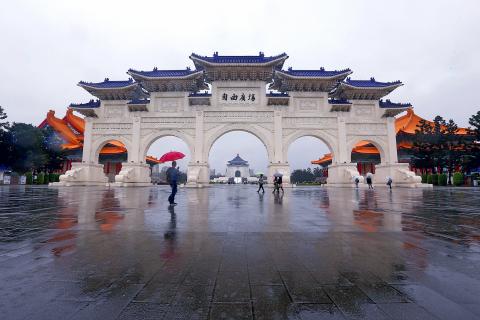President Tsai Ing-wen (蔡英文) yesterday announced the declassification of all historical records relating to the 228 Incident, saying that the measure is critical to establishing the truth and expediting transitional justice.
“Pushing for transitional justice is one of the most important missions for Taiwan’s democracy, but we often have to discern the truth from the mists, with the most crucial yet complicated task being uncovering and collecting the relevant documents, which are scattered across various government agencies,” Tsai said on Facebook.
Tsai’s Facebook post came after the government released a press release touting similar moves, in which it said the speedy declassification of confidential files was aimed at meeting the public’s expectation of transitional justice.

Photo: CNA
Tsai said collecting such material is also fundamental to the government’s efforts to compile a report on transitional justice, “as many traces of history can be found in past government documents, which reveal the names of the people involved, related incidents or other key elements.”
Of the National Achieves Administration’s documents relating to the 228 Incident — which total 1.37 million pages — 4,617 documents were classified, but they have all now been declassified in their entirety, Tsai said.
“In addition, the related political files containing a total of 990,000 pages from 83 different government divisions were listed as pending transfer [to the administration]. The transfer process is expected to be completed by the end of June,” Tsai said.
The Cabinet plans to allocate additional funds to the National Archives Administration to facilitate a three-year-long investigation and collection of political materials relating to the 228 Incident and the Period of National Mobilization for Suppression of the Communist Rebellion, which is to begin on March 1, Tsai said.
“That will provide the foundation for the writing of our investigative report on transitional justice,” she said.
The 228 Incident refers to a crackdown launched by the then-Chinese Nationalist Party (KMT) regime against civilian demonstrations following an incident in Taipei on Feb. 27, 1947. The event marked the beginning of the White Terror era, during which thousands of Taiwanese were arrested, imprisoned and executed. Historians estimate as many as 30,000 people were killed.
Presidential Office spokesman Alex Huang (黃重諺) said the latest development, goals and purposes of the government’s transitional justice commitment are expected to be the focal points of Tsai’s first speech on the 228 Incident as president.
“Pushing for transitional justice is a necessary process for any democratic nation undergoing a transition from authoritarian rule… It is the government’s responsibility to deal with illegitimate party assets, uncover the truth about human rights violations and problematic policies enacted during the rule of the authoritarian regime, and to restore people’s rights,” Huang said.
The transitional justice bill and the political archives bill have been listed as the Democratic Progressive Party caucus’ priorites in the current legislative session, Huang said.
After the passage of the bills into law, an investigative report on the White Terror era is to be published and a truth and reconciliation commission established, Huang said.

AIR SUPPORT: The Ministry of National Defense thanked the US for the delivery, adding that it was an indicator of the White House’s commitment to the Taiwan Relations Act Deputy Minister of National Defense Po Horng-huei (柏鴻輝) and Representative to the US Alexander Yui on Friday attended a delivery ceremony for the first of Taiwan’s long-awaited 66 F-16C/D Block 70 jets at a Lockheed Martin Corp factory in Greenville, South Carolina. “We are so proud to be the global home of the F-16 and to support Taiwan’s air defense capabilities,” US Representative William Timmons wrote on X, alongside a photograph of Taiwanese and US officials at the event. The F-16C/D Block 70 jets Taiwan ordered have the same capabilities as aircraft that had been upgraded to F-16Vs. The batch of Lockheed Martin

GRIDLOCK: The National Fire Agency’s Special Search and Rescue team is on standby to travel to the countries to help out with the rescue effort A powerful earthquake rocked Myanmar and neighboring Thailand yesterday, killing at least three people in Bangkok and burying dozens when a high-rise building under construction collapsed. Footage shared on social media from Myanmar’s second-largest city showed widespread destruction, raising fears that many were trapped under the rubble or killed. The magnitude 7.7 earthquake, with an epicenter near Mandalay in Myanmar, struck at midday and was followed by a strong magnitude 6.4 aftershock. The extent of death, injury and destruction — especially in Myanmar, which is embroiled in a civil war and where information is tightly controlled at the best of times —

China's military today said it began joint army, navy and rocket force exercises around Taiwan to "serve as a stern warning and powerful deterrent against Taiwanese independence," calling President William Lai (賴清德) a "parasite." The exercises come after Lai called Beijing a "foreign hostile force" last month. More than 10 Chinese military ships approached close to Taiwan's 24 nautical mile (44.4km) contiguous zone this morning and Taiwan sent its own warships to respond, two senior Taiwanese officials said. Taiwan has not yet detected any live fire by the Chinese military so far, one of the officials said. The drills took place after US Secretary

THUGGISH BEHAVIOR: Encouraging people to report independence supporters is another intimidation tactic that threatens cross-strait peace, the state department said China setting up an online system for reporting “Taiwanese independence” advocates is an “irresponsible and reprehensible” act, a US government spokesperson said on Friday. “China’s call for private individuals to report on alleged ‘persecution or suppression’ by supposed ‘Taiwan independence henchmen and accomplices’ is irresponsible and reprehensible,” an unnamed US Department of State spokesperson told the Central News Agency in an e-mail. The move is part of Beijing’s “intimidation campaign” against Taiwan and its supporters, and is “threatening free speech around the world, destabilizing the Indo-Pacific region, and deliberately eroding the cross-strait status quo,” the spokesperson said. The Chinese Communist Party’s “threats